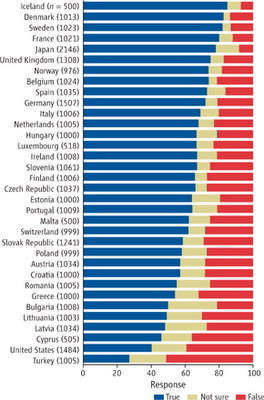This past weekend I spent more than an hour paralyzed in a book store. I had a $50 gift certificate to spend. I had in hand just one book that I knew I wanted. Otherwise, I spent time holding and replacing three others that I just kinda wanted. I ended up leaving with nothing.
I’ll be back, of course. This time with a plan, knowing what I’ll get. And I’ll definitely get that one book I knew I wanted: CivilWarLand in Bad Decline, by George Saunders.
I discovered Saunders a few years ago after one of his stories, “Jon,” was published in the New Yorker. It is the best story I have ever read in the New Yorker, and one of the most exciting short stories that I have read in years. I’ll paste an introductory section after the jump, and link to a full version.
The New Yorker used to have a link to the story up, but it no longer works. Unfortunately, the only online version I could find is in a terrible format for reading. If you’re interested, I’d recommend copying the text and pasting it into a word processor for easier reading. Here’s the teaser:
Jon
By George Saunders
Back in the time of which I am speaking, due to our Coördinators had mandated us, we had all seen that educational video of "It's Yours to Do With What You Like!" in which teens like ourselfs speak on the healthy benefits of getting off by oneself and doing what one feels like in terms of self-touching, which what we learned from that video was, there is nothing wrong with self-touching, because love is a mystery but the mechanics of love need not be, so go off alone, see what is up, with you and your relation to your own gonads, and the main thing is, just have fun, feeling no shame!
And then nightfall would fall and our facility would fill with the sounds of quiet fast breathing from inside our Privacy Tarps as we all experimented per the techniques taught us in "It's Yours to Do With What You Like!" and what do you suspect, you had better make sure that that little gap between the main wall and the sliding wall that slides out to make your Gender Areas is like really really small. Which guess what, it wasn't.
That is all what I am saying.
Also all what I am saying is, who could blame Josh for noting that gap and squeezing through it snakelike in just his Old Navy boxers that Old Navy gave us to wear for gratis, plus who could blame Ruthie for leaving her Velcro knowingly un-Velcroed? Which soon all the rest of us heard them doing what the rest of us so badly wanted to be doing, only we, being more mindful of the rules than them, just laid there doing the self-stuff from the video, listening to Ruth and Josh really doing it for real, which believe me, even that was pretty fun.
And when Josh came back next morning so happy he was crying, that was a further blow to our morality, because why did our Coördinators not catch him on their supposedly nighttime monitors? In all of our hearts was the thought of, O.K., we thought you said no boy-and-girl stuff, and yet here is Josh, with his Old Navy boxers and a hickey on his waist, and none of you guys is even saying boo?
Because I for one wanted to do right, I did not want to sneak through that gap, I wanted to wed someone when old enough (I will soon tell who) and relocate to the appropriate facility in terms of demographics, namely Young Marrieds, such as Scranton, PA, or Mobile, AL, and then along comes Josh doing Ruthie with imperity, and no one is punished, and soon the miracle of birth results and all our Coördinators, even Mr. Delacourt, are bringing Baby Amber stuffed animals? At which point every cell or chromosome or whatever it was in my gonads that had been holding their breaths was suddenly like, Dude, slide through that gap no matter how bad it hurts, squat outside Carolyn's Privacy Tarp whispering, Carolyn, it's me, please un-Velcro your Privacy opening!
Then came the final straw that broke the back of my saying no to my gonads, which was I dreamed I was that black dude on MTV's "Hot and Spicy Christmas" (around like Location Indicator 34412, if you want to check it out) and Carolyn was the oiled-up white chick, and we were trying to earn the Island Vacation by miming through the ten Hot 'n' Nasty Positions before the end of "We Three Kings," only then, sadly, during Her on Top, Thumb in Mouth, her Elf Cap fell off, and as the Loser Buzzer sounded she bent low to me, saying, Oh, Jon, I wish we did not have to do this for fake in front of hundreds of kids on Spring Break doing the wave but instead could do it for real with just each other in private.
And then she kissed me with a kiss I can only describe as melting.
So imagine that is you, you are a healthy young dude who has been self-practicing all those months, and you wake from that dream of a hot chick giving you a melting kiss, and that same hot chick is laying or lying just on the other side of the sliding wall, and meanwhile in the very next Privacy Tarp is that sleeping dude Josh, who a few weeks before a baby was born to the girl he had recently did it with, and nothing bad happened to them, except now Mr. Slippen sometimes let them sleep in.
What would you do?
Seriously. Read more here.
CONTINUE READING...
Collapse post








